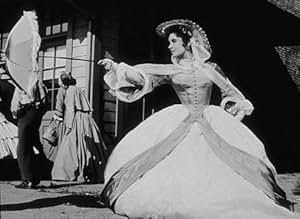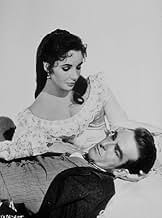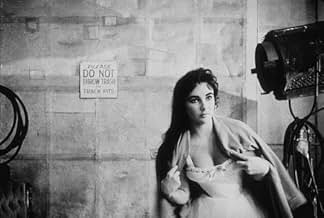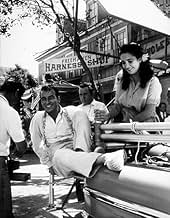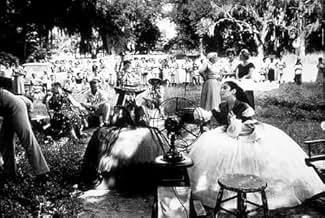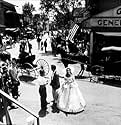Um estudante se apaixona por uma beldade sulista, mas o relacionamento deles é complicado pelo passado conturbado dela e pelo início da Guerra Civil.Um estudante se apaixona por uma beldade sulista, mas o relacionamento deles é complicado pelo passado conturbado dela e pelo início da Guerra Civil.Um estudante se apaixona por uma beldade sulista, mas o relacionamento deles é complicado pelo passado conturbado dela e pelo início da Guerra Civil.
- Direção
- Roteiristas
- Artistas
- Indicado a 4 Oscars
- 1 vitória e 8 indicações no total
- Townsman
- (não creditado)
- Parthenia
- (não creditado)
- Townsman
- (não creditado)
- Jake - Bartender
- (não creditado)
- Spectator
- (não creditado)
- Direção
- Roteiristas
- Elenco e equipe completos
- Produção, bilheteria e muito mais no IMDbPro
Avaliações em destaque
Trapping him into marriage with the lie that she's pregnant, and then proceeding to lose her hold on her sanity, Susanna detains the good and helpless John for eight years He is released, able to return to his magnificent dream and to his pure childhood sweetheart, only after tragic events
Retaining the essence of Ross Lockridge, Jr. best-seller, the movie states the equality of the unhappy romance with the Civil War: the personal drama is therefore a reflection of the nation's wounds According to the top-heavy symbolism, Susanna Drake represents the South, corrupting and dragging down the North; she's the Body contaminating the poet's Soul
Taylor plays Susanna Drake's character with an intensity that exceeds all her earlier work Montgomery Clift as the unlucky poet and Eva Marie Saint as his high school sweetheart and true love are on the remote side, but the scenes with Liz strike fire in a wonderfully brilliant way
With its battles and its formal balls, its magnificent riverboats and decayed mansions, its bordellos and madhouses, its childbirth and deathbed scenes, and its evacuation of Atlanta, Edward Dmytryk's "Raintree County," like its source, has undeniable epic dimension
But dark Elizabeth is Veronica to Saint's blond Betty. Or is it the other way around? No matter. Anyway they have contrasting personalities: the intensely passionate Taylor and the winsome and innocent Saint. Saint, for instance, would never dream of putting out for handsome, intelligent, and sensitive Monty, whereas Taylor does so on their second or third date and then LIES to him about having gotten pregnant. He doesn't mind one way or the other, besotted as he is.
I don't know whether it's worthwhile trying to get through the plot. It's probably been done elsewhere, and I'm too tired to trace the trips, the outbursts of anger and guilt, Sherman's march through Georgia, and the finale, which no power on earth could force me to reveal. Much of it has to do with the fear of having a touch of the tar brush in one's blood.
But I must say, New Orleans is given rather a bad rap as a representative Southern city. It wasn't like any of the others. It had an animated and rich multi-ethnic heritage at the time -- American, French, Spanish, Caribbean, and African. Edgar Degas visited French relatives there late in the '19th century. Slaves of course but not nearly as brutal a system as elsewhere. William Tecumseh Sherman taught at Louisiana State Seminary of Learning & Military Academy, later to become Louisiana State University.
Others have claimed that it was easy to tell the difference between pre- and post-accident scenes of Montgomery Clift but I couldn't. As for the accident, Clift was doing booze and other substances to excess on a daily basis during the shooting. I mean, eating steaks he'd spilled on the floor and so on. After an evening at Liz Taylor's manse perched on a hill, he drove drunkenly down the winding road and didn't quite make it.
Neither the accident nor the booze seemed to interfere with his acting, although the part of the pathetic loner in "A Place in the Sun" suited him better than the idealist he's forced to portray here. Elizabeth Taylor is blindingly beautiful. Many of her films cast her has a frustrated nut job. Eva Marie Saint has the more sympathetic role as the unspectacular girl from home who never manages to shrug off her love for Clift.
It's long. It has an overture and even an entr'acte, evocative photography by Robert Surtees, and a lushly orchestrated but fulsome score by Johnny Green. It's no "Gone With the Wind," though, partly because it substitutes anguish for laughs.
Clearly, MGM was hoping for something approaching "Gone with the Wind" - and, they failed. However, "Raintree County" is not so bad, when viewed without the comparative eye. The big budget production values are beautiful; the obvious expense, and the cast, helps maintain interest in the relatively weak storyline. And, it does get better, as the starring triad (Clift, Taylor, and Saint) slowly draw you into their lives. Viewing will require some degree of commitment, though; it's a long movie.
Early in the filming, Clift left a visit with friends at Taylor's home, and drove his car into a telephone pole. He nearly died, and his facial "reconstruction" is obvious throughout most of "Raintree County". Clift's performance is uneven, also - but, he was too good an actor to be completely derailed. And, Clift is better than you might have heard. Also, he, does not look as bad as many have claimed. The eventual toll on his "looks" was mainly taken by a growing dependence on alcohol and painkillers.
Taylor, who is credited with saving Clift's life, shows some of the sparkle that would quickly make her one of the best actresses in the business, especially during the film's second half. Nigel Patrick, Lee Marvin, Rod Taylor, and Agnes Moorehead head up a strong supporting cast. Robert Surtees' savory cinematography is noteworthy. And, Nat King Cole sings the Johnny Green title song, a minor hit, very sweetly.
****** Raintree County (10/4/57) Edward Dmytryk ~ Montgomery Clift, Elizabeth Taylor, Eva Marie Saint
This is trying to be a new Gone with The Wind but it's rather sluggish. The first two hours are a melodrama. Montgomery Clift is a functional heroic lead. Susanna's race heritage is somewhat interesting but her craziness distracts from its sincere seriousness. It could have been a nuanced dissection of race in the south. Like the blackface moment, the movie skirts the issue by blowing it up. Then comes a half hour of war epic. The war epic is not that epic. It's a lighter version of the burning of Atlanta. All in all, it isn't Gone with the Wind. It's only a breeze.
While "Raintree County" was in rehearsals, Montgomery Clift's drinking was out of hand, and threatened to hamper production. Elizabeth Taylor had no real influence on him, despite being his dearest friend and soulmate. Many in the cast and crew expressed their concerns to MGM higher-ups. This led to a series of meetings between Clift and MGM Production Chief Dore Schary. "Raintree" had a $5 million budget, the highest of any American film up to that time, so it was up to Schary to solve problems on the set or behind the scenes before they happened.
Schary left the meetings believing Clift was sincere in his desire to straighten up and behave himself. But he was not convinced that Monty would be able to do it. His demons were too powerful; every picture he made was held hostage to Clift's self-destructiveness. Schary decided to take out a $500,000 insurance policy on "Raintree County" just in case there was a halt in production for whatever reason.
Schary had never done this before, but his "funny premonition" tragically came to pass.
On May 12, 1956, half of "Raintree County" had been filmed. Elizabeth and other of Monty's friends had prevailed upon him to stay sober during shooting, and he was trying to live up to his side of the bargain. At a party at Elizabeth's and husband Michael Wilding's that night, Monty was sober and quiet. He had one glass of wine, and made his excuses and left. He was uncertain about driving down the steep hill to Sunset Blvd., and asked his close friend, Kevin McCarthy ("Invasion of the Body Snatchers") to lead him to the road.
McCarthy described many times in later years seeing Monty's headlights move wildly from one side of the road to the other in his rearview mirror. Then he watched in horror as Monty's car slammed into a telephone pole.
Montgomery Clift's impossibly beautiful profile and the planes of a face the camera adored were destroyed. He was crumpled on the floor of the car, his face and jaws crushed. Elizabeth Taylor resisted all attempts to keep her from going to his side. When she got to him, she straightened him up and pulled his two front teeth out of his throat before he strangled on them.
Recovery was long, slow; unbearably painful. Monty had friends sneak liquor into the hospital. Three weeks after rebuilding his jaws, Monty's doctors realized they had done the job incorrectly. They re-broke his jaws and wired them again.
Production was shut down for weeks. With over $2 million already invested in it, MGM was not about to abandon "Raintree," nor replace its star. Resumption of the project was primarily a question of money for the studio, but to Monty and those who loved him it was a question of pride.
Weeks after the accident, Monty was allowed to see himself in a mirror for the first time. He was not elated with the results, but relieved to see he looked enough like himself that he could continue acting in front of cameras. Greater than his pain had been the fear that his career was over.
Montgomery Clift returned to work on "Raintree County" knowing that the picture was no better than when he left. He returned knowing that audiences would come to see it to play a ghoulish game: they would try to spot him "before" and "after." He returned to the production numbed and dulled by painkillers and alcohol.
Despite his horrific ordeal, despite the liquor and the pills that eased his pain and enabled him to complete the picture, I still believe Montgomery Clift's performance of Johnny Shawnessy to be one of his best.
Clift had an unusual voice and unorthodox phrasing. On screen he was intuitive and sensitive, his portrayals always highly intelligent. However much he rehearsed (and he was notorious for doing things to death) Clift's readings always seemed quite natural. The accident changed none of these things. And equally fine performances were to come, in "Lonelyhearts" (1958), "The Misfits" and "Wild River" (both 1960); and "Judgment at Nuremburg" (1961).
Montgomery Clift died 40 years ago this week, on July 22, 1966. He was 45 years old. But part of him had died ten years earlier on a twisting road in the Hollywood hills. The accident that nearly killed him left him prey to his weaknesses but also to the enormous strength and passion that informs his later performances. "Raintree County" divided Monty Clift's life into "before" and "after."
Você sabia?
- CuriosidadesThe scenes which Montgomery Clift shot for this movie just before his accident represent the only color footage available of him before he was disfigured. All of his previous movies had been shot in black-and-white.
- Erros de gravaçãoAfter Abraham Lincoln's 1860 election, the crowd sings "The Battle Hymn of the Republic". However, Julia Ward Howe wrote the poem on which the song was based for the Atlantic Monthly in 1861.
- Citações
Susanna Drake: That 4th of July race... what happens when you win?
John Wickliff Shawnessy: Well, according to a friend of mine, if I win, a beautiful girl will place a garland of oak leaves on my sun-colored locks.
Susanna Drake: I'd like to be that girl.
John Wickliff Shawnessy: Maybe it can be arranged?
Susanna Drake: Oh, it can be arranged, all right. *I'll* arrange it.
- Versões alternativasThe longer Roadshow version was released on VHS by Warner, where it was labeled as Reconstructed Original Version. It has also been shown on Turner Classic Movies cable channel. This version contains nearly 15 minutes of additional material not found on the General Release Version.
- ConexõesEdited from ...E o Vento Levou (1939)
- Trilhas sonorasRaintree County
Music by Johnny Green (uncredited)
Lyrics by Paul Francis Webster
Sung by Nat 'King' Cole
Principais escolhas
Detalhes
Bilheteria
- Orçamento
- US$ 5.000.000 (estimativa)
- Faturamento bruto mundial
- US$ 6.543
- Tempo de duração3 horas 2 minutos
Contribua para esta página



